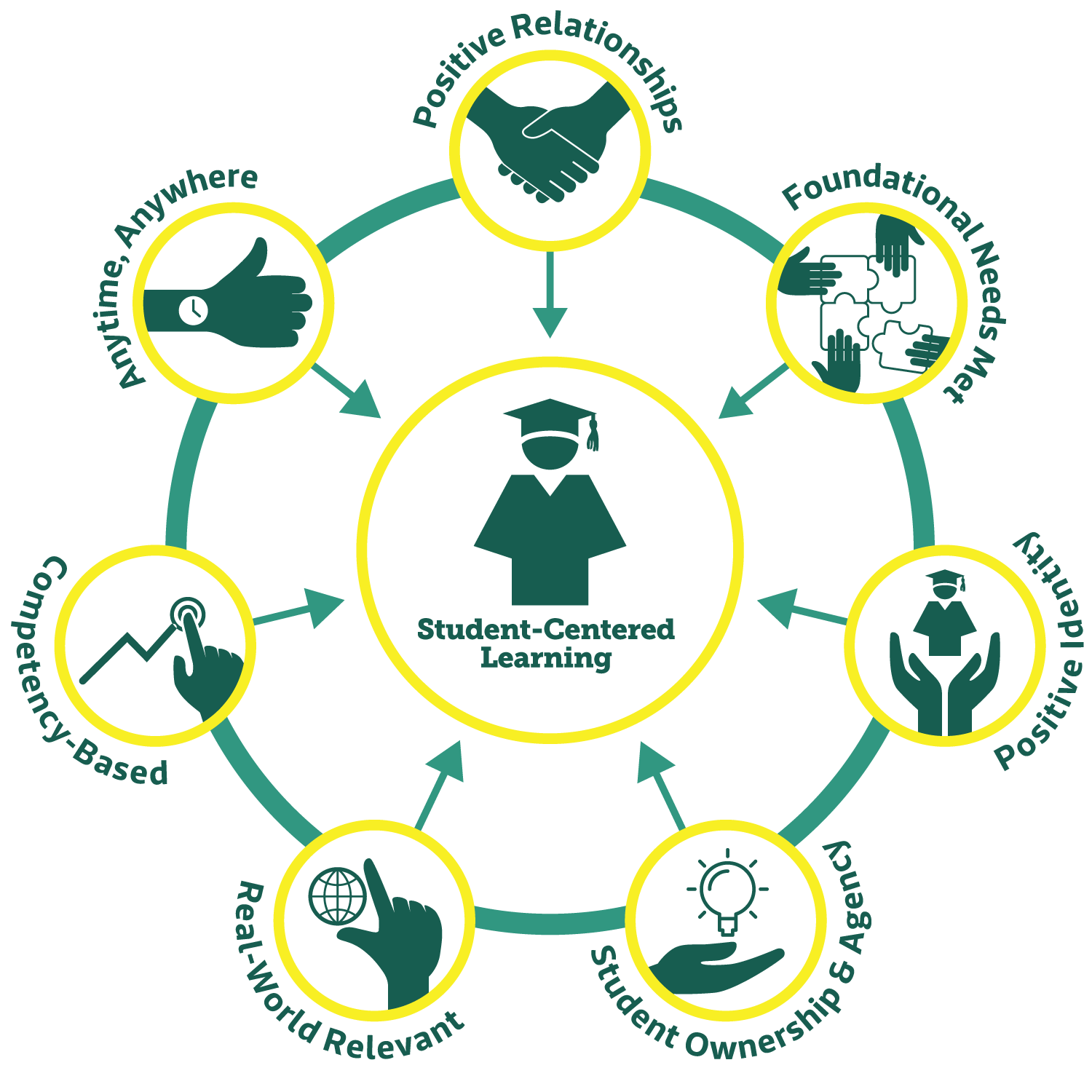
Resource Collection • January 2019
The following is a list of our favorite resources that can be helpful to educators working to design and implement student-centered learning. It includes both resources published both by Education Evolving and by others.
Our goal is not to create a comprehensive database; there are dozens of large resource libraries out there. Rather, we’ve curated a set of “greatest hits” resources across several common categories. Browse all nine categories below or click one of the links to jump down.
Resources on designing, creating, and running student-centered schools:
- Design thinking and the school design process
- Leadership and change management
- Defining and measuring success
- Managing technology and operations
Resources on implementing specific student-centered learning principles:
- Positive relationships and honoring identity
- Meeting foundational student needs
- Anytime, anywhere and real-world relevant learning
- Competency-based learning and student agency
Resources on particular instructional designs:
1. Design thinking and the school design process
Shared Purpose Discussion Starter
Guide. Use this discussion starter to explore how to define you team’s shared purpose, develop team cohesion around that purpose, and evolve it as the school matures.
Design Thinking for Educators
Toolkit. Helpful tools and techniques for facilitating a design thinking process among a group of students, educators, and community members. This guide is published by IDEO, a world leader in the art and practice of design thinking.
What Does Co-Creation Mean to You?
Research and Background Info. Caroline Hill, founder of the DC Equity Lab and co-founder of the Equity Design Collaborative, explains the importance of designing with people rather than for them. It also includes a few tips on how to make this shift in your team’s process.
2. Leadership and change management
Switch Workbook: How to Change Things When Change is Hard
Guide. This workbook was created by the authors of the excellent book, Switch, to guide teams who are orchestrating major changes in any field. It steps the reader through useful questions and exercises to practice throughout the book.
Teacher-Powered Discussion Starters
Guide. These eight Discussion Starters are designed for teacher teams who are working through creating or improving a teacher-powered school. Offering lessons learned and tips from educators in teacher-powered schools, these interactive resources feature discussion questions for teams to take up as a group.
Community Toolbox
Toolkit. A website that provides resources and tools to help people work together through community and system change. The site has a focus on collaborative leadership.
Shaping the Future of Learning: K-12 School-Based Education Strategy Workbook
Guide. This workbook published by KnowledgeWorks mixes inspiring real-world school stories with guiding questions to help the user identify key changes that need to be made as well as strategies to make those changes.
The Art of Coaching Teams: Building Resilient Communities that Transform Schools
Book. Practical suggestions, tools, and instructions for the art of developing a team, including getting organized, keeping work on track, bringing people together to accomplish difficult tasks, developing healthy communication, and managing conflict.
Building Support for Student-Centered Learning: A Toolkit
Toolkit. A collection of useful tools to help you throughout your process of change toward a student-centered learning model. In particular, it contains tools to build support for student-centered learning among colleagues, leadership, families, and more.
3. Defining and measuring success
Defining and Measuring Student-Centered Outcomes
Research and Background Info. Education Evolving’s review of the outcomes that researchers and communities identify as important for student success in the 21st century, and an overview of possible strategies for measuring them.
NGLC MyWays Toolkit
Toolkit. The MyWays Toolkit, built by Next Generation Learning Challenges, can help a community walk through a set of exercises to define and measure expanded student outcomes.
CASEL Assessment Guide
Guide. A guide for practitioners developed by CASEL—national leaders in social-emotional learning (SEL)—with information on how to select and use SEL measures and data, a searchable catalog of numerous SEL assessments, and case studies of how practitioners are using SEL assessments.
RAND Education Assessment Finder
Toolkit. A web-based tool with information about assessments of K-12 students’ interpersonal, intrapersonal, and higher-order cognitive competencies. Explore what assessments are available, what they are designed to measure, and how they are administered.
CCE’s Performance Assessment Toolkit
Toolkit. A resource by the Center for Collaborative Education—widely recognized as experts in performance assessment—to accompany their 2012 guide on performance assessments. Includes tools for constructing and calibrating valid, reliable performance assessments of broader and deeper student outcomes.
4. Managing technology and operations
EdSurge Product Index
Toolkit. This comprehensive, searchable database of education technology products can help select the best software to use at your school. Includes ratings and reviews across a variety of categories including curriculum, adaptive games, learning management platforms, student information systems, professional learning, and more.
Blended Learning Universe Roadmap
Toolkit. This roadmap by the Blended Learning Universe helps schools and districts build effective blended learning programs. It includes a tool to help determine which technologies are best for your program as well as a directory of schools that is searchable by various blended models.
Resource Guide for School Facilities
Background Info & Guide. This resource steps the reader through the daunting process of securing a physical space for your school—including finding a suitable location, negotiating a lease, and securing expert legal and broker help if needed.
5. Positive relationships and honoring identity
A Year at Mission Hill: Chapter 6, “Like a Family”
Case Study. This short video is part of a longer series featuring Mission Hill, a K-8 school in Boston. It explores the question: How can schools cultivate safe, nurturing spaces for everyone involved in children’s lives?
Family-School-Community Partnerships 2.0: Collaborative Strategies to Advance Student Learning
Report. This National Education Association report identifies 10 key strategies for creating effective family-school-community partnerships. The second part of the report explores how 16 different communities use these strategies to engage parents and communities, and recommendations for advancing this important work.
Restorative Practices in Schools Program Directory
Directory. This is an excellent directory for Minnesota educators exploring restorative justice services and trainings for their school. It lists organizations and trainers who offer restorative justice-based services alphabetically by region with contact information, services, and trainings offered along with links to their websites.
Trainer’s Guide for Working with Schools to Implement Restorative Practices
Guide. This guide was written by two of Minnesota’s leading experts on restorative justice implementation in schools. Beckman and Riestenberg step readers through each stage of implementing restorative justice mindsets and policies in schools.
6. Meeting foundational student needs
CASEL Implementation Tools and Resources
Toolkits & Guides. A rich set of tools and guides used by practitioners around the world to provide guidance and support as they implement social-emotional learning in their schools and districts.
Community Schools: Promoting Student Success–A Rationale and Results Framework
Research and Background Info. This report by the Coalition for Community Schools outlines the important role community schools can and do play in increasing student success and strengthening families and community.
Community Needs Assessment (from Illinois Federation for Community Schools
Sample Documents. A series of needs assessments for 4th through 12th graders, teachers, and parents. It also includes a facilitation plan for conducting community focus groups.
Creative Interventions Toolkit: A Practical Guide to Stop Interpersonal Violence
Toolkit. An extensive, extremely thoughtful toolkit that outlines steps that can be taken in any community to address, reduce, end, or prevent violence—what the authors call violence intervention.
7. Anytime, anywhere and real-world relevant learning
A Year at Mission Hill – Chapter 8: The World of Work
Case Study. This short video is part of a longer series featuring Mission Hill, a K-8 school in Boston. This particular chapter provides a glimpse into how they collaborate with community partners to provide students at every level an opportunity to tackle authentic, real problems.
Learning Through Internships Toolkit
Toolkit. Developed by internship experts, Big Picture Learning, this toolkit offers a detailed step-by-step walkthrough of the process to develop an internship program. Includes numerous examples of internship projects that help the toolkit contents come to life.
Work-Based Learning Toolkit
Toolkit. Published by the U.S. Department of Education, this toolkit approaches work-based learning from a more technical angle, answering questions about employer relationships, dealing with workplace liability issues, aligning with Perkins, and more.
Minnesota Department of Education CTE and Work-Based Learning Resources
Website. This page features links to key resources and forms that will be helpful to Minnesota educators looking to implement work-based learning. See in particular the very helpful document linked on this page: A Reference Guide to Minnesota Work-Based Learning Programs.
P-TECH Workplace Learning Resources
Website. A collection of sample documents and other helpful resources maintained by P-TECH, an organization of public-private partnerships where students take high school and college coursework while simultaneously engaging in industry-guided workforce development.
8. Competency-based learning and student agency
Competency-Based Education FAQ
Research and Background Info. This FAQ produced by Education Evolving provides a quick overview of what competency-based education is and how it benefits students.
From Vision to Reality: Personalized, Competency-Based Learning for All Kids
Guide. A guide with a series of specific questions and steps for schools and districts interested in charting a course to competency-based education structures.
Competency-Based Education: A New Architecture for K-12 Schooling
Book. This book from competency-based education guru, Rose Colby, provides extensive guidance on how to define standards-aligned competencies, build performance assessments, create learning pathways, and more. Includes concrete examples of competencies and performance assessments.
Part 1: What Do You Mean When You Say “Student Agency”? and
Part 2: Toward a Culturally-Responsive Understanding of Student Agency
Two Articles. The term “student agency” has become a buzzword in education circles. But what does it really mean? Is it a feature of learning experiences, or a learning objective that students seek to develop? This great pair of articles seeks to unpack and understand this complicated phrase.
9. Project-based learning
Projects and Project-Based Learning: What’s The Difference?
Video. This video produced by Edutopia does an excellent job at clarifying the distinction between projects and true project-based learning. A great background video for those getting started on project-based learning.
Project-Based Learning for the 21st Century: Skills for the Future
Research and Background. This short report provides useful background into how project-based learning works and why it has merit.
The PBL Playbook: A Step-by-Step Guide to Actually Doing Project-Based Learning
Book. This recent book by A.J. Juliani is a guide for teachers looking to implement project-based learning into their schools. The book answers many common questions regarding implementation and what PBL looks like in each grade level and subject area.
Innovative Schools Network: Wisconsin Teacher-Powered Schools Sample Resources for Curriculum
Website. This website contains links to a number of sample project-based learning documents from teacher-powered schools (High Marq, Valley New, and Wildlands), including project checklists, justification guides, reflection guides for students, and spreadsheets for reporting students’ credits. For teachers, there are advising guides. (Scroll about halfway down on the page, to the “Curriculum” section.)
